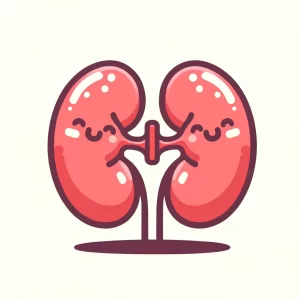The Kidney Stone 24-Hour Urine Test. What’s Causing My Kidney Stones?
The Kidney Stone Formation Risk Panel, 24-Hour Urine Test is a comprehensive evaluation designed to uncover the reason for kidney stones and the risk of forming stones in the future. This test measures various compounds in your urine that can contribute to kidney stone formation, including calcium, oxalate crystals, uric acid, and citrate levels, among others.
Why This Test Matters In Kidney Stone Disease.
Identifying the risk factors for kidney stone formation is crucial. It allows for the implementation of personalized prevention strategies to minimize the risk of future kidney stone formation. Understanding these risk factors can lead to dietary adjustments, lifestyle changes, and sometimes medication to help prevent new stones from forming. Ordering the Kidney Stone Urine Test can provide valuable insights into your urinary chemistry, guiding targeted interventions to reduce your risk of kidney disease.
Labs Markers Included in Your Order (24-Hour Collection)
| Test Name | Reference Range | Description |
|---|---|---|
| Cystine, Urine, Qualitative | Negative | Qualitative analysis for cystine to assess risk of cystine stones. |
| Urine Volume | 500-4000 mL/24 hr | Volume of urine produced in a day to assess hydration status. |
| Calcium Oxalate in the urine (saturation) | 6.00-10.00 | Saturation level indicating risk of calcium oxalate crystals stone formation. |
| Calcium, Urine | 100-300 mg/24 hr | Amount of calcium excreted in urine to assess risk of calcium stones. |
| Calcium Phosphate Saturation | 0.50-2.00 | Saturation level indicating risk of calcium phosphate stone formation. |
| pH, 24 hr, Urine | 5.800-6.200 | Urine acidity level, important in stone formation risk. |
| Uric Acid Saturation | <1.00 | Uric acid saturation levels to evaluate risk of uric acid stones. |
| Uric Acid, Urine | <800 mg/24 hr | Amount of uric acid in urine, indicating risk of uric acid stones. |
| Sodium, Urine | 50-150 mmol/24 hr | Sodium excretion levels to evaluate dietary sodium intake and its effect on stone risk. |
| Potassium, Urine | 20-100 mmol/24 hr | Potassium excretion levels, important for assessing dietary intake and stone risk. |
| Magnesium, Urine | 30-120 mg/24 hr | Magnesium excretion levels, important for stone risk assessment. |
| Phosphorus, Urine | 600-1200 mg/24 hr | Phosphorus excretion levels to evaluate risk of stone formation. |
| Ammonium, Urine | 15-60 mmol/24 hr | Ammonium excretion levels, important for acid-base balance and stone risk. |
| Chloride, Urine | 70-250 mmol/24 hr | Chloride excretion levels, reflecting dietary intake and risk of stone formation. |
| Sulfate, Urine | 20-80 meq/24 hr | Sulfate levels in urine, related to protein metabolism and stone risk. |
| Urea Nitrogen, Urine | 6.00-14.00 g/24 hr | Urea nitrogen excretion, reflecting protein intake and metabolism. |
According to The University of Chicago’s Kidney Stone Guide, “Understanding your risk factors for kidney stone formation can significantly guide preventive measures and reduce recurrence rates.”
Kidney Stone Lab Test FAQs
What is the 24-hour urine test for?
This test evaluates your risk for forming kidney stones by analyzing 24-hour urine composition, including calcium oxalate crystals in the urine.
What causes high and low levels?
Diet, hydration status, medications, and genetic factors can influence the levels of compounds in your urine that are associated with kidney stone risk.
What are the signs and symptoms of kidney stone disease?
Symptoms may include severe pain, nausea, vomiting, blood in urine, and frequent urination.
How often should I retest?
Retesting frequency depends on your initial results and any changes in symptoms or risk factors, typically annually or biannually. Consult with your treating physican.
How accurate is this kidney stone test?
The 24-hour urine test is highly accurate and is a standard in assessing kidney stone formation risk.
How do I get this test?
After placing your order, a test kit will be mailed out to you. Our team will be in contact to help guide you through the collection process and the return shipment of your test kit.
What happens if there is an issue with the lab test sample?
Don’t worry, if there is any issue with sample stability, or an error at the lab, we can get you retested at no cost.
Are test results private and confidential?
Lab results are provided securely through your TrueHealthLabs.com results tab under “My Account.” Results may be provided to local, state, or federal health authorities, but only when legally required, as in the case of communicable diseases like STDs or COVID-19. Review our privacy policy for more details.
To learn more, see our comprehensive guide to kidney stone testing.
References
- National Institute of Diabetes and Digestive and Kidney Diseases (NIDDK)
- The University of Chicago’s Kidney Stone Guide
Reviewed by Jeff Donohue M.D. from Body Logic and Brady Hurst DC, CCCN. Written by True Health Labs team of editorial health contributors. Disclaimer: This information is for educational purposes only and not intended as medical advice. Consult your healthcare provider for personalized guidance.
Medical Review Board
Reviewed by Jeff Donohue M.D. from Body Logic and Brady Hurst DC, CCCN. Written by True Health Lab’s team of editorial health contributors.
Disclaimer: This information is for educational purposes only and not intended as medical advice. Consult your healthcare provider for personalized guidance.
Also rated 4.6 out of 5 based on 3439 ShopperApproved reviews- See all TrueHealthLabs.com reviews.





